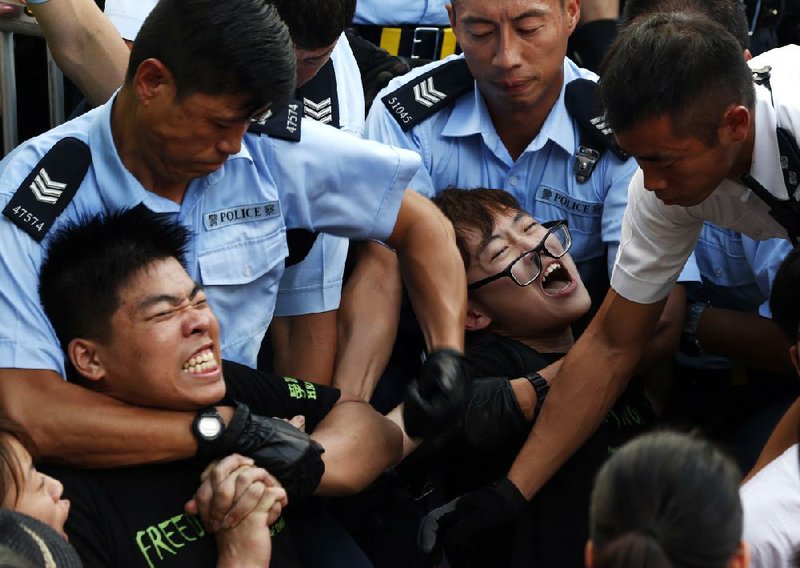BEIJING -- Hong Kong police arrested more than 500 people today after tens of thousands in the former British colony joined a march to push for democracy.
Coming on the heels of several clashes between the two sides, the march on Tuesday encapsulated the growing anger and resentment in Hong Kong as well as mainland China's refusal to cede political control.
Tens of thousands streamed from Hong Kong's Victoria Park into its business district. Many held banners demanding suffrage. Others had placards decrying the Chinese government. Some could be heard chanting the revolutionary song "Do You Hear the People Sing?" from the musical Les Miserables.
"We don't want communist Hong Kong," one man's sign read.
Police said 98,600 people joined Tuesday's rally at its peak, while organizers said 510,000 turned out, the highest estimates in a decade. Hong Kong University researchers put the number at between 154,000 and 172,000.
The arrests happened after the rally, when two student groups held a sit-in overnight to "occupy" a street in the city's financial district. Police moved in early today to remove the protesters one by one, taking away 511 people for unlawful assembly and preventing police from carrying out their duties.
Others held a similar sit-in at government headquarters to await Chief Executive Leung Chun-ying's arrival at work.
July 1, a public holiday marking the handover of Hong Kong from London to Beijing, has become an annual day of protest. This year a focal point for demonstrators' anger was a policy document, or "white paper," released last month by China's Cabinet that said Hong Kong's high degree of autonomy is not inherent but is authorized by the central government.
A thriving financial hub and former British colony, Hong Kong was returned to Chinese rule in 1997, with the promise of eventual universal suffrage. Until now, its chief executives -- the top leadership post in Hong Kong -- have been chosen by a largely pro-Beijing committee.
The protest comes days after nearly 800,000 residents voted in an informal referendum aimed at bolstering support for full democracy. Beijing denounced the referendum as a political farce.
Behind much of the recent democratic agitation in Hong Kong is the Occupy Central With Love and Peace movement, the organizers of which have threatened civil disobedience in the financial district if authentic universal suffrage is not granted.
There is a growing fear that Hong Kong's values, such as democracy and freedom of speech, are beginning to bend under increasing pressure from Beijing.
In late February, three days after a demonstration by journalists and intellectuals in the region in support of press freedom, Kevin Lau Chun-to, who was fired as chief editor of Ming Pao, was attacked by two unknown men and stabbed six times in the back and legs.
Last month, Hong Kong news media alleged that two banks, HSBC and Standard Chartered, had pulled ads from Apple Daily, a popular newspaper known for its criticism of Beijing, at the request of Chinese authorities. Last month, allegations surfaced that a large bookstore chain, called Eslite, had removed books on Tibet and human rights for fear of angering Beijing as the company plans to expand into the mainland market.
Taking out a half-page ad in Hong Kong newspapers last week, the world's four largest accounting firms -- Ernst & Young, PricewaterhouseCoopers, Deloitte and KPMG -- also voiced opposition to the Occupy Central movement. That prompted a counterad Monday purportedly purchased by Hong Kong employees of the four firms disagreeing with their bosses' stance.
Organizers released the results of the referendum this week, and the proposal that garnered the most votes, 42.1 percent, rejected many of the conditions laid out by Beijing's white paper and called for allowing chief executive candidates to be chosen by the public, a nominating committee and political parties.
But the Hong Kong government reiterated in a statement Tuesday that such public nomination is against current regulations.
Information for this article was contributed by William Wan and Xu Yangjingjing of The Washington Post and by Kelvin Chan, Stephanie Ip and Josie Chang of The Associated Press.
A Section on 07/02/2014

